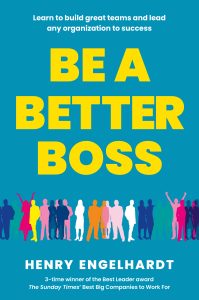This is the final piece by Henry Engelhardt, above, in a three-part analysis of what makes a successful business person. Henry is founder and CEO emeritus of Admiral Group plc. In this piece, Henry highlights the importance of creativity in business. Click here to read his first article and here to read the second one.
By Henry Engelhardt
The third key to building a successful organisation and being a great leader is the one most people don’t see coming: creativity. You cannot do something exactly as it’s already being done and hope to win. You must do SOMETHING differently.
I can already hear a lot of wannabe leaders groaning now and thinking ‘but I’m not really very creative’. First, I’d say that’s rubbish. You can learn to be creative. But, secondly, even if you aren’t, you can promote a culture of creativity that does the job for you.
To be creative you can start by solving a problem. Necessity really is the mother of invention. If you’re looking at your numbers and see your sales costs are too high, start dreaming of ways to reduce them, either by spending more efficiently or having the same spend drive more sales. I use the word ‘dream’ purposefully. You need to learn to push the potential solutions to the edge of their proverbial envelope. In short: start thinking crazy! What is the craziest solution you can think of? Start there. You can always adjust to be more conventional but if you don’t push your thinking to the extremes, you probably won’t do a good enough job exploring potential answers.
You can challenge your people in the same way. People tend to ignore regular numbers that don’t move much. We tend to look for the exceptions in our reports. That is, if your conversion rate is always 24%, 25% or 26% and one month you see it’s 8% you are going to jump and look to take some action. (Equally, if it’s 52% you will jump, perhaps with joy, and wonder what in the world is going on.)
However, just because the number is static doesn’t mean we shouldn’t think about it. You should go to the person with responsibility for conversion and tell them the new target is 70%. If their first reaction isn’t ‘that’s impossible’ then you haven’t set the bar high enough.
Incremental change is good. I’ve no problem with it. But often a business needs radical change and radical thinking. A lot of great inventions came from radical thinking. To push people to think radically you need to get them out of their comfort zones. If you asked the manager to get the conversion rate up to 27% they’d probably nod their head, make a few tweaks, examine a few things and, with a tail wind, move the dial up a notch. But if you ask them to move conversion from 25% to 70% they are going to have to take the process apart brick by brick and reassemble it in a better way. In short, they are going to have to do things very differently to achieve this target. Now possibly they don’t reach 70%. But maybe they get to 50%. That would be okay, wouldn’t it? If you ask for 27% you are unlikely to get to 50%. If you push hard for 70% you might get a substantial bump in conversion.
There are many ways, including the above, to stimulate a management team to think creatively. Here are two more ideas: 1) have a book club dedicated to children’s books. Children’s books are wildly creative (what were some of those authors smoking???). 2) Take the team to an art museum, divide them into small teams and have them create stories behind some of the artwork. Tell them the craziest story will win a prize.
In short, push them to break down the barriers we create ourselves that limit our thinking.
Another technique is to analyse industries that are completely foreign to yours, maybe bringing in a speaker from that faraway business. You may very well be able to apply techniques that are quite common elsewhere but would be heresy in your industry.
Remember too that creativity is not limited to customer-facing. Being internally creative is just as important. When we were faced with accusations of favouritism in internal promotions, we created an independent reviewing body made up of people from all levels of the company who had to approve each promotion. No person from the department making the promotion could be on that committee. It was a creative way to sort out an internal problem that was creating dissonance inside the organisation.
In sum, there is no shortage of creative ways to be creative!
Three Keys To Success – A Final Word (or two)
Making a successful business and being a great leader/manager is not easy. There are no rules; there is no formula. I believe that if you can
- make great decisions,
- be great with people
- be creative
you stand the best chance of success.
If you want to be a great leader/manager but you don’t think you’ve reached ‘great’ yet, you need to ask yourself: what are you doing about it? Going into work each day is good but the school of hard knocks is a very hard, often slow education. If you really want to move up the ladder you have to do more than that. There are many things you can do like:
- Talk with anyone and everyone you can about their industry, job, manager, leader … find out what good looks like and what bad looks like.
- Practice data interrogation. When your partner suggests going to see a movie on Saturday night start thinking of all the questions you should ask like, what film? What time? Where is it playing? Will we go with other friends? Do they have good popcorn? … Train yourself to ask good questions; good data interrogation will lead to better decision making and better movie nights.
- Never forget: the Team, the Team, the Team. Use your team. The idea of ‘the buck stops here’ is balderdash.
- Read books and/or listen to podcasts. Use other people’s experience to shorten your learning curve.
- Lastly, take the time to think. Put it in your diary for Tuesday’s at 16h: think time. We often do a lot of managing but we don’t do a lot of thinking. Just spend time thinking about where the business is, how you and the team are coping, what could have gone better and what you could have done to make it go better, what do you stand for as a manager, have you been an effective leader, etc. Think time is really important.
Finally, let me tell you that I went to a good high school and did well, but wasn’t top of my class. I went to a good university, again, I did well but wasn’t top of my class. I went to a good MBA programme but failed to make the Dean’s List. The point of this is that I am not extraordinary. So, if I can do it, you can do it. So do it!
 Henry Engelhardt is the founder and CEO emeritus of Admiral Group plc. He started the insurance company in the early 90s (it was called Admiral so that it would appear at the top of the Yellow Pages’ listings). Originally American, Henry settled in Wales attracted by the tax breaks the region offered to set up new enterprises. Today, Admiral is headquartered in Cardiff and is the only FTSE 100 company in Wales. It is the 50th largest listed company in the UK. Moreover, it has been consistently included in the Sunday Times Best Companies to Work in the last 20 years. Henry’s new book, Be a Better Boss: Learn to build great teams and lead any organisation to success, is published by whitefox publishing.
Henry Engelhardt is the founder and CEO emeritus of Admiral Group plc. He started the insurance company in the early 90s (it was called Admiral so that it would appear at the top of the Yellow Pages’ listings). Originally American, Henry settled in Wales attracted by the tax breaks the region offered to set up new enterprises. Today, Admiral is headquartered in Cardiff and is the only FTSE 100 company in Wales. It is the 50th largest listed company in the UK. Moreover, it has been consistently included in the Sunday Times Best Companies to Work in the last 20 years. Henry’s new book, Be a Better Boss: Learn to build great teams and lead any organisation to success, is published by whitefox publishing.


